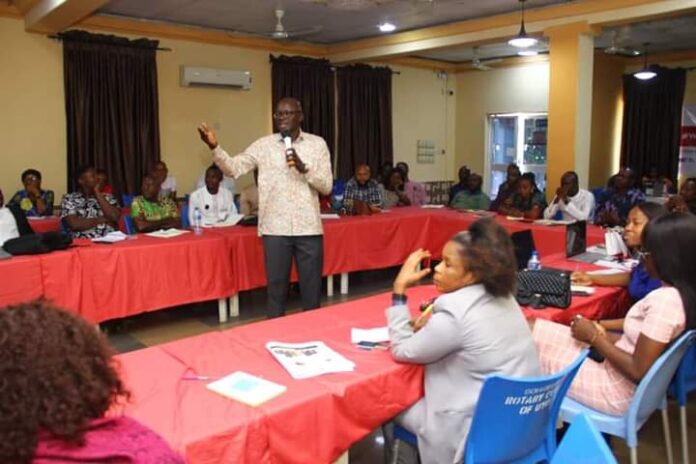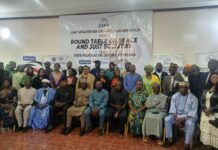A cross-section of participants at the workshop.
Abasifreke Effiong
Policy Alert, a non-governmental organisation working on fiscal and environmental justice in the Niger Delta, has trained journalists, civil society organisations and community-based advocates from oil bearing communities in Niger Delta on tracking beneficial ownership data in the extractive sector and using extractive data to make accountability demands.
The two day extractive sector literacy and data analytics workshop held in Uyo, Akwa Ibom state, as part of Policy Alert’s #WetinWeGain project seeks to deepen advocacy on beneficial ownership and create massive public awareness in oil swap contracts awarded by the Nigeria National Petroleum Corporation, NNPC.
The Executive Director of Policy Alert, Mr. Tijah Akpan said the training was to acquaint journalists, CSOs and community-based advocates with extractive data, build their capacity to understand the data and use it to shine the light on institutions and actors in oil trading transactions.
He said despite reforms in the extractive sector such as the Petroleum Industry Act, the Companies and Allied Matters Act (CAMA) 2020, and resources provided in the Nigeria Extractive Industries Transparency Initiative (NEITI), utilization of these reforms for strengthening accountability and anti-corruption has been very weak.
Akpan said the #WetinWeGain campaign seeks to democratize oil and gas and mining sector data in relation to payment, contract details and company ownership to give citizens a fact-based information to demand accountability from government and extractive companies.
READ: CSO calls for pitches from journalists interested in investigating oil swap deals in Nigeria
In a goodwill message by the Executive Secretary of NEITI, Dr. Orji Ogbonnaya presented via webinar by Mr. Kazeem Lameed, lauded Policy Alert for the effort at building the capacity of journalists and CSOs in working around data in the extractive sector.
Goodwill messages were also sent by the #OpeningExtractive team (Open Ownership and EITI) .
Issues discussed at the workshop include; “Nigeria’s extractive sector – context and issues for media and civil society advocacy”, “Entry points for data-driven investigations on oil swap deals”, “Fighting ownership secrecy in Nigeria – Understanding the CAMA 2020 Act; navigating the portal”.
Other topics discussed were, “Nigeria’s oil swap deals – Early insights and findings from the Beneficial ownership data use project by Policy Alert and #OpenExtractives” and “Essential skills and hacks for data journalism and advocacy”.
The training was supported by Open Society Initiative for West Africa, OSIWA.
















